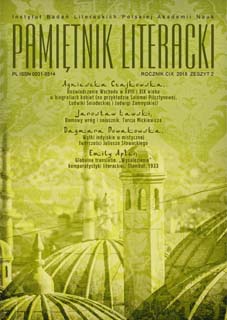Globalne translatio. „Wynalezienie” komparatystyki literackiej, Stambuł, 1933
Global Translatio: The “Invention” of Comparative Literature, Istanbul, 1933
Author(s): Emily ApterContributor(s): Olga Mastela (Translator)
Subject(s): Studies of Literature, Theory of Literature
Published by: Instytut Badań Literackich Polskiej Akademii Nauk
Keywords: comparative literary studies; global translatio; Leo Spitzer; Erich Auerbach
Summary/Abstract: Referring to the attempts made in the last years by various scholars to define comparative studies, Emily Apter in her “Global Translatio” traces the Istanbul beginnings of comparative literary studies which date back to the 1930s. In the worldwide exchange of ideas that took place there (against the background of mosaic of Eastern and Western languages), she discerns the true germs of transnational humanism or precisely–global translatio. Sketching the picture of the then Istanbul as a city which attracted scholars from all over Europe and showing the powerful influence over the Turkish students and lecturers of, inter alia, an Austrian Romanist Leo Spitzer, employed at the Faculty of Literature of Istanbul University from 1933 to 1936, Apter in a sense revises the foundation myth of exile developed by Erich Auerbach in the “Afterword to Mimesis.” In her view, Istanbul at that time was neither a secluded spot nor an intellectual desert, as Auerbach seemed to perceive it. Contrary to that, Apter firmly maintains that considering the fact that Spitzer established a lively school of philology in this city, that he himself studied Turkish and in his papers used numerous languages may markedly influence the present understanding of comparative studies as “worlded” minoritarian comparatism. Arguing that the early comparative literary studies were globalised from their outset, she warns against forgetting such sources of literary thought on the now arising global market of culture.
Journal: Pamiętnik Literacki. Czasopismo kwartalne poświęcone historii i krytyce literatury polskiej
- Issue Year: 2018
- Issue No: 2
- Page Range: 75-102
- Page Count: 28
- Language: Polish

